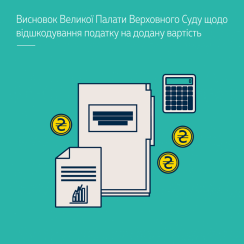Contact center of the Ukrainian Judiciary 044 207-35-46

Such a way of protection of rights as obligation to include a company’s claim into the Tentative Register of Claims on Recovery of Sum of Budgetary Reimbursement pursuant to item 56 of Subchapter 2 of Chapter XX “Transitional Provisions” of the Tax Code of Ukraine by 1 February 2017 will not result in effective renewal of tax payer’s right.
The SC Grand Chamber concluded that an effective way of protection, which would ensure the renewal of a plaintiff’s violated right, was represented by the recovery of dues from the State Budget of Ukraine for him with the reimbursement of value-added tax and fine calculated for the sum of such dues.
Courts of previous instances found that the plaintiff had submitted an electronic tax bill on value-added tax to a body of tax service, where he had noted the sum to be compensated from the budget to the payer’s bank account. In addition to the tax bill the plaintiff submitted a claim on the recovery of the sum of budgetary reimbursement and the calculation of sum of budgetary reimbursement.
The supervisory authority had held a documental unscheduled on-site inspection of the lawfulness of the budgetary reimbursement of value-added tax to the payer’s bank account, pursuant to the conclusions of which it was found that it was impossible to confirm the sum of budgetary reimbursement due to the lack of responses to requests on holding counter inspection at the supply chains.
While solving the dispute, the SC Grand Chamber deviated from the opinion noted in the Resolutions of the Supreme Court of Ukraine of 16 September 2015 in the case No. 21-881а15, of 17 November 2015 in the case No. 21-4371а15, of 2 December 2015 in the case No. 21-2650а15, of 20 April 2016 in the case No. 21-452а16, of 7 March 2017 in the case No. 820/19449/14. Pursuant to the legislative opinion of the Supreme Court of Ukraine, the procedure of reimbursement of value-added tax shall be performed by the body of the State Treasury Service of Ukraine and shall not be provided by means of judicial charging directly (simultaneously) with holding judicial supervision of decisions of supervisory authorities adopted under results of the examination of taxes sums claimed to be reimbursed, or separately from holding such control. The reimbursement of value-added tax from the State Budget of Ukraine is an exclusive authority of tax bodies and bodies of the State Treasury; thus, court may not substitute a state body and solve issues on such debt recovery.
The SC Grand Chamber took into account that the law did not establish the dependence of payment of budgetary reimbursement to a tax payer on VAT payment by its counteragents or on the grounds of inconclusive verification of the tax payer’s counteragents, as well as due to the lack of responses to a tax body’s requests on holding counter inspection at the supply chains.
Herewith, failure to submit the opinion, which includes the sum to be reimbursed from the budget, to the body of the State Treasury Service of Ukraine by the supervisory authority after the completion of the inspection and non-payment of debts on account of VAT due to this, may not deprive the tax payer from the right to get budgetary reimbursement, if this tax payer submitted documents provided by the Tax Code of Ukraine, and shall not deprive the tax payer from the right to demand exaction of a fine.
Therefore, the SC Grand Chamber found that in case of lack of the mechanism of the real reimbursement of coordinated sum of budgetary reimbursement of the noted tax for a tax payer, budget debt with the reimbursement of value-added tax shall be recovered from the State Budget of Ukraine through the General Office of the State Treasury Service of Ukraine in Kyiv in the favor of the plaintiff.
Follow the link http://reyestr.court.gov.ua/Review/80427413 to see the full text of the Resolution of the Grand Chamber of the Supreme Court of 12 February 2019 in the case No. 826/7380/15 (proceedings No. 11-778апп18) in the Unified State Register of Judgments.